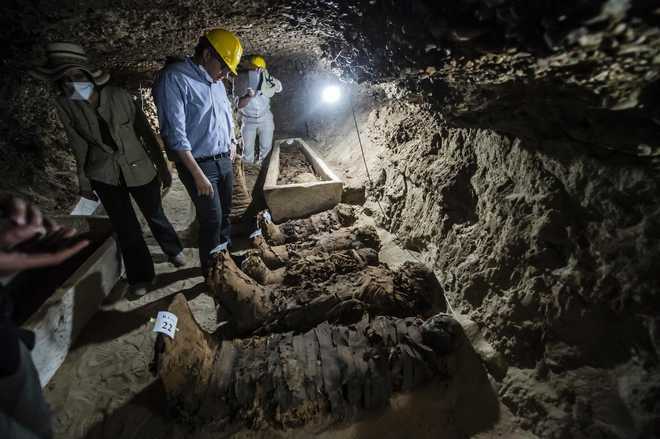
Egyptian Antiquities Minister Khaled el-Enany (C) inside catacombs in the Touna el-Gabal district of the Minya province in central Egypt. AFP
Berlin, May 31
Ancient Egyptians were most closely related to Turkish and European populations than Sub-Saharan Africans, say scientists who analysed the first genome data from Egyptian mummies.
Researchers, including those from University of Tuebingen in the Germany, also found that modern Egyptians share more ancestry with Sub-Saharan Africans.
The team successfully recovered ancient DNA from Egyptian mummies dating from about 1400 BC to 400 AD.
They found that ancient Egyptians were most closely related to ancient populations in the Levant, and were also closely related to Neolithic populations from the Anatolian Peninsula and Europe.
The data shows that modern Egyptians share about eight per cent more ancestry on the nuclear level with Sub- Saharan African populations than with ancient Egyptians, researchers said.
Researchers looked at genetic differentiation and population continuity over a 1,300 year timespan, and compared these results to modern populations.
The team sampled about 151 mummified individuals from the archaeological site of Abusir el-Meleq, along the Nile River in Middle Egypt.
They recovered mitochondrial genomes from 90 individuals, and genome-wide datasets from three individuals.
The team was able to use the data gathered to test previous hypotheses drawn from archaeological and historical data, and from studies of modern DNA.
“In particular, we were interested in looking at changes and continuities in the genetic makeup of the ancient inhabitants of Abusir el-Meleq,” said Alexander Peltzer, one of the lead authors of the study from the University of Tuebingen.
“We wanted to test if the conquest of Alexander the Great and other foreign powers has left a genetic imprint on the ancient Egyptian population,” said Verena Schuenemann, from University of Tuebingen.
This study counters prior skepticism about the possibility of recovering reliable ancient DNA from Egyptian mummies.
Despite the potential issues of degradation and contamination caused by climate and mummification methods, researchers were able to use high-throughput DNA sequencing and robust authentication methods to ensure the ancient origin and reliability of the data.
The study was published in the journal Nature Communications. — PTI



























